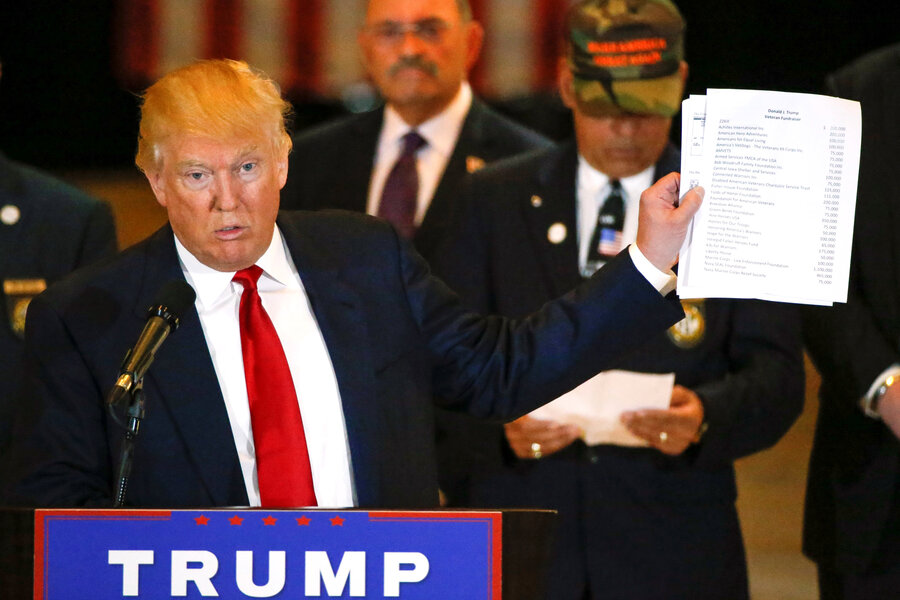What the 'playbooks' of Trump University tell us
Loading...
Trump University gave employees detailed instructions on how to entice people to enroll in its real estate seminars, from targeting people making at least $90,000 a year and choosing words of flattery that are most persuasive to picking music for the gatherings — The O'Jays' "For the Love of Money."
The "playbooks" for the now-defunct business owned by Donald Trump, the presumptive Republican nominee for president, were unsealed Tuesday in a class-action lawsuit by customers who say they were defrauded. Last Friday, a judge who has earned Trump's scorn sided with attorneys for The Washington Post who argued that the public had a right to know what was previously confidential.
The documents outline how employees should guide customers through "the roller coaster of emotions" once they have expressed interest.
"The motivation that they experienced can die quickly as the realities of their daily lives take over. It is our job to rekindle that motivation ... to make them once again see the potential of achieving their dream," according to a "sales playbook."
A 2009 playbook quotes a Yale University study that found the most persuasive words in the English language are: you, new, money, easy, discovery, free, results, health, save, proven, guarantee and love.
"They share three characteristics: they are simple, familiar and dramatic."
"The words 'I noticed' have a powerful subconscious effect on people because they send a subliminal message to them that they stood out in the crowd, that they are attractive or charismatic or that they impressed you," the playbook continues. "People love recognition and attention."
Trump University offered a three-day seminar for $1,495, using it as a springboard to sell more expensive "TrumpElite" packages for up to $34,995 a year.
"You don't sell products, benefits or solutions — you sell feelings," according to the sales playbook.
Trump University's core customers are identified in the documents as male heads of households between 40 and 54 years old with annual household incomes of at least $90,000, a college education and a net worth of more than $200,000.
One way to identify buyers is to ask what they do for a living. "Let them know that you've found an answer and a way for them to change their lifestyles."
During one-on-one conversations, "you may begin with some small-talk to establish rapport but do not let them take control of the conversation," a playbook reads. "You must be very aggressive during these conversations to in order to push them out of their comfort zones."
"If they complain about the price, remind them that Trump is the BEST!! This is the last real estate investment they will ever need to make."
For those who have hit credit limits, employees are told to suggest they dip into savings or identify other "seed capital."
"Money is never a reason for not enrolling in Trump University; if they really believe in you and your product, they will find the money," a playbook reads.
Trump University is the target of two lawsuits in San Diego and one in New York that accuse the business of fleecing students with unfulfilled promises to teach secrets of success in real estate. Plaintiffs contend thatTrump University gave seminars and classes across the country that were like infomercials, constantly pressuring customers to buy more and, in the end, failing to deliver.
Trump has maintained that customers were overwhelmingly satisfied with the offerings — a point that his attorneys repeated after the documents were unsealed. The documents included testimony from several satisfied customers.
"Much of the unsealed evidence, including declarations and surveys from former Trump University students, demonstrates the high level of satisfaction from students and that Trump University taught valuable real estate information," said Jill Martin, vice president and assistant general counsel for The Trump Organization. "Trump University looks forward to using this evidence, along with much more, to win when the case is brought before a jury."
The documents show meticulous attention to details such as seating at seminars. Room temperature should be set no higher than 68 degrees, and music should be The O'Jays "For the Love of Money."
Employees are told to avoid speaking with the news media.
"Reporters are rarely on your side and they are not sympathetic," a 2010 playbook reads.
The 6-year-old case in San Diego is scheduled to go to trial shortly after the November presidential election.
Trump has railed against U.S. District Judge Gonzalo Curiel, who ordered the documents unsealed. At a rally in San Diego on Friday, he accused the judge of being "hostile" and a "hater of Donald Trump," and raised questions about his ethnicity.
"The judge, who happens to be, we believe, Mexican, which is great, I think that's fine," Trump said of Curiel, who was born in the U.S.
It was the second time Trump has brought up the judge's ethnicity as he complained about his treatment.







